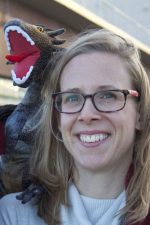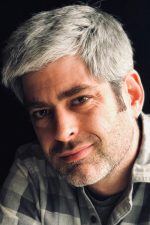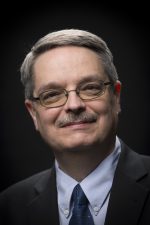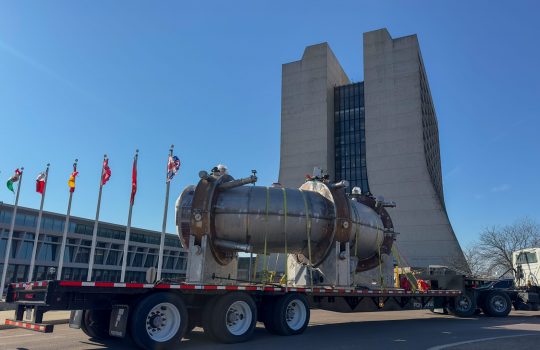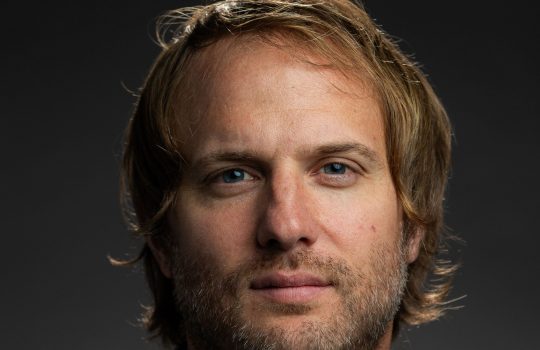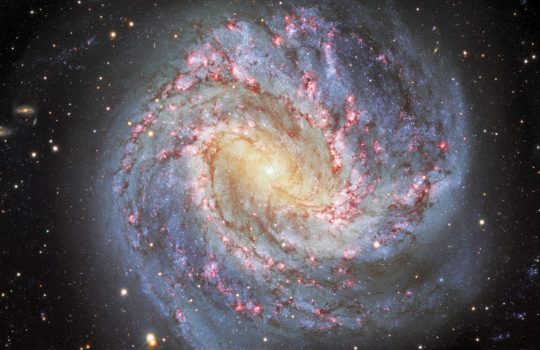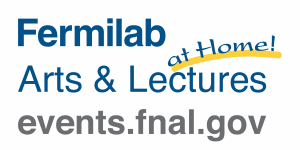
The new Fermilab Arts and Lectures At Home events are available for free with registration at events.fnal.gov.
This July, the Fermilab Arts and Lecture Series debuts a new way for science enthusiasts to learn. The new Fermilab Arts and Lectures At Home series features live lectures and an art gallery talk presented on Zoom. These events are available for free with registration through the Arts and Lecture Series’ online ticketing.
More talks will be added to the series line-up in the coming months. Four talks are already scheduled and cover a variety of topics: mapping the colors of a nebula with an astrophotographer, discussing the science behind popular TV shows and movies, exploring the first few seconds of our universe’s existence and puzzling over Einstein’s unfinished dream.
At Home events will be presented via Zoom webinar and can be viewed on any computer or smart phone. Registered attendees will receive an email notification with directions on the day prior with a link to the presentation. You need only to click on that link to be able to see the live event. Q&A will be available. If you do not have a smart phone or require ASL assistance, please contact us at least 48 hours prior to the event so that we can provide you with alternate access. To register for these events, use the online ticketing available through events.fnal.gov.
Wednesday, July 22, 7:30 p.m. Central time – virtual – free
Gallery talk with astrophotographer Eric Coles
The Hubble Palette – Mapped Colors of Emission Nebula: A Live Demonstration
Space- and Earth-based telescopes look at a wide variety of the electromagnetic spectrum, from radio waves through the visible spectrum to high-energy gamma rays. They use different filters or sensors to select these wavelengths. But when scientists and astrophotographers want to represent this information in an image, they are limited to the visible spectrum. The collected wavelengths, for example, the infrared, need to be “mapped” to a color humans can see. Learn how astrophotographers make this visual transition and developed what is now known as The Hubble Palette.
Friday, July 31, 7:30 p.m. Central time – virtual – free
From Game of Thrones to Frozen: What Hollywood Can Teach Us About the Importance of Science in Storytelling – Rebecca Thompson, head of Education and Public Outreach, Fermilab
The finale of “Game of Thrones” was the most-watched single show in HBO’s history. “Frozen II” was the highest-grossing animated movie ever. Clearly these blockbusters, and others like them, are telling stories that people want to hear. They are also packed with science concepts. From Valyrian steel to snow anchors, storytelling relies on science to draw in and keep an audience. Just as important is how they can use deviations from real-life science effectively, without pushing the audience out of the story. This talk will focus on how pop culture juggernauts incorporate science, whether consciously or unintentionally, to strengthen the story and audience engagement.
Rebecca Thompson is the head of education and public outreach at Fermilab. After receiving her Ph.D. in physics from the University of Texas at Austin, she joined the staff of the American Physical Society, where she led their public engagement efforts for 11 years. While there she authored the popular “Spectra, The Laser Superhero” series of physics comic books. She is a fellow of the American Physical Society and a member of the Sigma Xi honors society. Her first book, “Fire, Ice, and Physics; The Science of Game of Thrones,” was released in October 2019.
Friday, Aug. 21, 7:30 p.m. Central time – virtual – free
At the Edge of Time: Exploring the Mysteries of our Universe’s First Seconds – Dan Hooper, Fermilab, head of the Theoretical Astrophysics Group
Over the past few decades, we have made incredible discoveries about how our cosmos evolved over the past 13.8 billion years. But there remains a critical gap in our knowledge: We still know very little about what happened in the first seconds after the Big Bang. This talk will examine how physicists are using the Large Hadron Collider and other experiments to re-create the conditions of the Big Bang and to address mysteries such as how our universe came to contain so much matter and so little antimatter. Could these tools enable us to discover the nature of dark matter and how it was formed in our universe’s first moments? Can we lift the veil on the era of cosmic inflation, which led to the creation of our world as we know it?
Dan Hooper is a senior scientist and the head of the Theoretical Astrophysics Group at Fermilab and a professor of astronomy and astrophysics at the University of Chicago. His research focuses on the interface between particle physics and cosmology, and he is especially interested in questions about dark matter and the early universe. He is the author of three books, including “At the Edge of Time.“
Friday, Sept. 11, 7:30 p.m. Central time – virtual – free
Understanding God’s Thoughts: Einstein’s Unfinished Dream – Don Lincoln, Fermilab
“I want to know how God created this world. I am not interested in this or that phenomenon, in the spectrum of this or that element. I want to know His thoughts; the rest are details.” — Albert Einstein.
Einstein spent the last decades of his life trying to work out a theory that would explain all known phenomena. He failed, but his vision has been pursued by generations of researchers – and there have been many popular science books and articles that imply that such a theory could be right around the corner. In this talk, Fermilab scientist Don Lincoln will explain the current status in this timeless quest and give the audience a sense of the prospects for completing Einstein’s dream. Could it happen in our lifetimes?
Don Lincoln is a senior scientist at Fermilab. He was a member of the teams that discovered the top quark in 1995 and the Higgs boson in 2012. Lincoln is also an avid popularizer of science. He has written several books for the public, most recently “The Large Hadron Collider.” He also writes for many online venues such CNN, Scientific American and many others. He appears frequently on the Fermilab YouTube channel.

